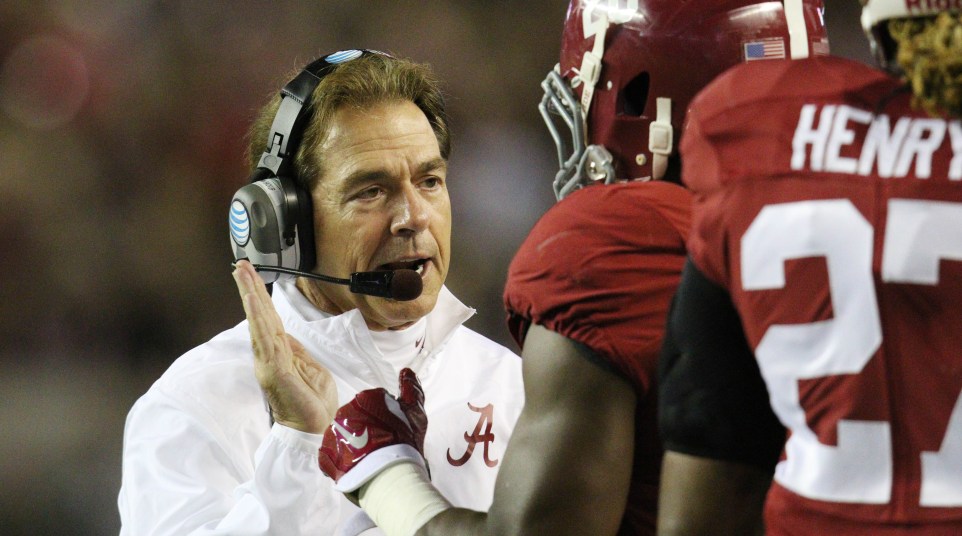Taylor dismissal shines light on issue of risk vs. reward in recruiting
The Alabama Crimson Tide dismissed defensive tackle Jonathan Taylor last weekend less than three months removed from his enrollment at the university as a junior college transfer. That alone makes Alabama look just a little bit foolish.
Now consider Taylor was dismissed due to an arrest on domestic violence charges Saturday night, the same issue that earned him a dismissal from Georgia’s football program just last July. That doesn’t exactly fit the mold of how Alabama hopes to brand its football program.
Taylor spent last fall at Copiah-Lincoln Community College in Wesson, Miss., hoping to rehabilitate his image, get his academics in order and try and earn another shot with an FBS program. Not only did he get that shot, but he got it with one of the most storied programs in college football history and one of the top coaches in the game today. It took him less than one semester to blow his second chance.
But while Taylor once again attempts to get his life in order away from the field, his dismissal shines a light on a greater issue surrounding recruiting in college football; that of risk versus reward, and how to determine which players with troubled pasts are worth giving an opportunity.
One Alabama beat reporter sent out a pair of tweets Sunday after Taylor’s dismissal that got me thinking about why exactly Alabama looks so poor after this incident.
Bringing Jonathan Taylor in never made sense to me. It was a risk Alabama didn't need to take, and they've been burned badly for it.
— Aaron Suttles (@AaronSuttles) March 29, 2015
Everyone deserves another chance in life. But not everyone deserves it at the one of the best programs in the country.
— Aaron Suttles (@AaronSuttles) March 29, 2015
The second tweet resonated with me. Plenty of players begin careers with major programs, fall off course for one reason or another, get back on track in junior college then return to the FBS better prepared to succeed on and off the field. There’s merit to wanting to give a kid that young another chance.
But even if he appears to right himself in junior college, it’s still a risk to a certain extent to bring on someone with a troubled past. And with the wealth of talent and tremendous depth Alabama boasts at every position on the roster, it was a risk Alabama didn’t need to take.
Taylor was going to get his second chance even if Nick Saban never spoke a word to him. He’s supremely talented, and players arrested on similarly egregious charges have come back to show newfound maturity and work ethic. Someone was going to bring Taylor back to the FBS.
But Alabama is already loaded at defensive tackle. We just said it, Alabama is loaded everywhere. Adding Taylor was a luxury, not a necessity. Why take a risk for an unnecessary luxury? Hindsight is 20-20, but many have questioned Saban’s move signing Taylor in the months since it happened.
The other side of that coin is Ole Miss’ recruitment of top junior college quarterback Chad Kelly, who was dismissed from Clemson last spring for bad behavior off the field. He spent a year tearing up the junior college ranks then signed with Ole Miss, only to be arrested outside a nightclub in his hometown of Buffalo, N.Y., less than a week later.
But Ole Miss is not Alabama. Ole Miss is a tremendous program rapidly rising in the SEC West under head coach Hugh Freeze, but it is not Alabama and Freeze is not Saban.
The Rebels were in desperate need of a new starting quarterback upon Bo Wallace’s graduation, and because the Rebels do not enjoy an overwhelming wealth of talent at the position as Alabama does at defensive tackle, the risk was worth taking.
Imagine Alabama’s and Ole Miss’ football programs are businesses; Alabama is already the industry standard, and really just needs to maintain a clean image and continue its already successful process to stay on top.
Ole Miss, on the other hand, is the fast-rising company that serves as a threat to the industry standard. But in order to keep rising, it cannot afford any major setbacks, meaning it must take risks here and there to get to the top.
Kelly was one of those risks, and after his most recent arrest Hugh Freeze took ownership of his signing of Kelly and said any further incidents were also a reflection on him. He brought Kelly on a mission trip to Haiti during Ole Miss’ spring break, and Kelly has reportedly progressed nicely in spring practice without any off-field issues.
Freeze took the risk, took ownership of the risk, and appears prepared to reap the reward come the fall.
Saban took a risk he never needed to take and was burned. Had Alabama never recruited Taylor, the outlook of this season would be the exact same. Now the program must spend time this spring wiping egg from its face.
Programs must understand where they lie in the landscape of college football, how they’re trending, just how risky a player is and if the reward he can add is worth the risk at that particular program. Need for talent is a factor; performance in junior college is a factor; standing within your conference is a factor.
When taking these variables into account, Ole Miss adding Kelly appears to make a lot of sense in hindsight. Alabama signing Taylor, however, simply does not.

